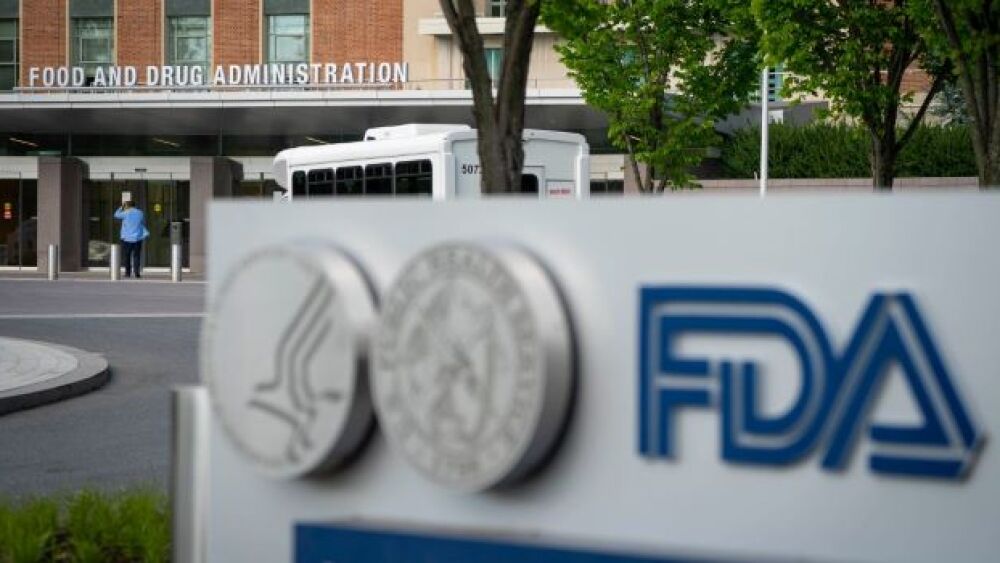The House of Representatives voted on a bill that would give the U.S. Food and Drug Administration more power to ensure biopharma companies run large follow-up trials to confirm accelerated approvals.
Sarah Silbiger/Getty Images
On Wednesday, the U.S. House of Representatives voted on a bill that would give the U.S. Food and Drug Administration more power to ensure biopharma companies run large follow-up trials to confirm accelerated approvals. The bill must be passed by September, or the FDA will face funding gaps.
Over the last couple of years, the use of accelerated approvals has received more scrutiny. Typically, accelerated approvals are granted to drugs with a high unmet need and require biopharma companies to conduct post-marketing studies to determine if the drugs are as effective as they appeared to be in earlier trials. Often, these accelerated approvals are based not on clinical efficacy, but on biomarkers indicating physiological improvement.
The now-classic example is Biogen’s Aduhelm (aducanumab) for Alzheimer’s disease. The drug was approved on the basis that it cleared beta-amyloid plaques, not on improving cognition or memory. The clinical trials on which Aduhelm’s approval was based gave inconsistent and complex data that suggested at the highest dose, the drug might slow the progression of the disease.
In March 2021, BioSpace noted that the FDA appeared to be cracking down on accelerated approvals, due to a trend of these being rescinded and unexpected rejections. It wasn’t clear if this was related to a COVID-19-related backlog or potentially, the agency’s lack of a permanent commissioner. At the time, Dr. Janet Woodcock, M.D., was the interim commissioner.
Examples of accelerated approvals that were rescinded include Merck voluntarily withdrawing Keytruda for metastatic small cell lung cancer (SCLC) with disease progression on or after platinum-based chemotherapy and at least one other previous line of therapy. Only a week later, AstraZeneca withdrew its own checkpoint inhibitor, Imfinzi, in bladder cancer over a similar response. The Imfinzi accelerated approval was to be confirmed by the Danube study but did not hit the overall survival endpoints compared to the standard of care.
Of accelerated approvals, companies have voluntarily withdrawn 28. The FDA has only pulled one.
House members voted 392-28 to pass H.R. 7667, which would set a $1.15 billion base fee for human prescription drugmakers for the fiscal year 2023. It would overhaul the accelerated approval process and include provisions for improving clinical trial diversity.
It is a major step required to reauthorize the user fees the FDA receives from drug and medical device companies for fiscal years 2023 through 2027. The current authorization will expire on September 30, 2022. Congress hopes to finalize the new package before the August recess.
In terms of accelerated approvals, the package passed by the House allows the FDA to remove any drugs from the market that received accelerated approval if they don’t demonstrate a clinical benefit. Accelerated approvals typically require companies to run confirmatory clinical studies, but they are often given long periods of time to do so.
For example, Sarepta Therapeutics’ Exondys 51 (eteplirsen) received accelerated approval for Duchenne muscular dystrophy (DMD). It was required to conduct a two-year, randomized controlled trial to verify the drug’s benefits. The confirmatory trial isn’t expected to wrap until 2026, a full 10 years since it was first approved.
A study by Evaluate Vantage in 2021 found that of 23 accelerated approvals granted from 2010 to 2020 in non-oncology drugs, only four had converted to full approvals by way of clinical confirmation. And those took an average of 3.5 years to do so.
Woodcock herself recently told the Wall Street Journal, “Accelerated approval has really proved itself as a very effective tool. People pick out the failures, but when we did accelerated approval, we said there would be more uncertainty. If accelerated approval had the same success rate as regular approval, we wouldn’t be doing anything special at all.”
One of the aspects included in the new bill is that the FDA would have the legal authority to require that confirmatory trials are underway before granting accelerated approval. It would also decrease the number of steps the agency requires to get the drug withdrawn. The bill would also allow the regulator to set enrollment targets for clinical trial participants, protocols and milestones, including the date the trials would target for completion.





